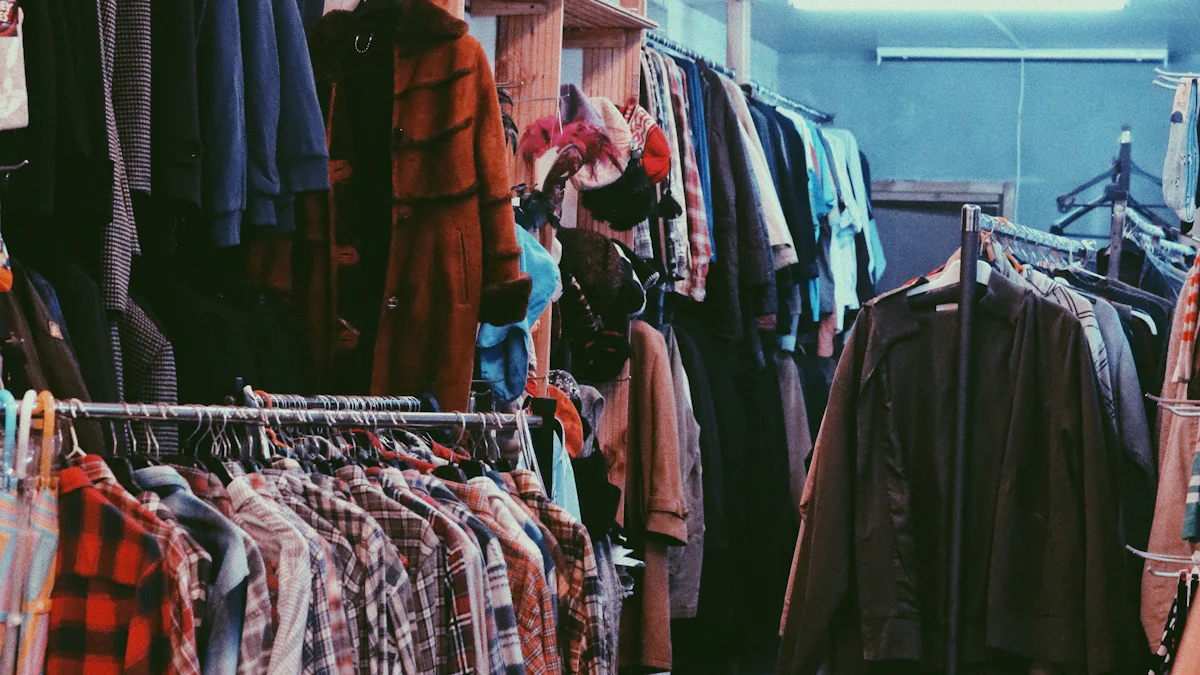
The Vancouver Reselling Trend
In the vibrant city of Vancouver, a sustainable trend has taken root in the fashion industry. The practice of reselling clothing has gained popularity, offering a multitude of advantages for both the environment and consumers alike. This coastal seaport city in British Columbia, Canada, known for its eco-friendly initiatives and stunning natural landscapes, has embraced the concept of sustainable fashion through reselling.
The Pacific Northwest region, including Vancouver, has been at the forefront of green and environmentally friendly practices, making it an ideal location for the rise of the reselling trend. As consumers become more conscious of their environmental impact, the demand for sustainable fashion options has grown significantly. In this context, reselling clothing not only aligns with Vancouver's eco-friendly ethos but also presents a practical solution to reduce fashion waste and promote a circular economy.
The Vancouver reselling trend represents a shift towards more ethical and environmentally friendly fashion practices. By embracing reselling, individuals can contribute to long-term sustainability while enjoying affordable and stylish clothing options. This trend reflects Vancouver's commitment to promoting sustainable living and fostering a more conscious fashion culture.
Benefits
Environmental Impact
When it comes to the environmental impact, reselling clothing plays a pivotal role in reducing clothing waste and promoting sustainable fashion practices. By giving clothing items a second life, the practice of reselling significantly minimizes the amount of textile waste that ends up in landfills. This reduction in waste aligns with eco-friendly and green initiatives, contributing to a more sustainable approach to fashion consumption.
Moreover, by extending the lifecycle of clothing items through reselling, there is a decrease in the demand for fast fashion production. Fast fashion often leads to overproduction and excessive use of natural resources, making it detrimental to the environment. The shift towards reselling in Vancouver reflects a commitment to environmentally friendly practices and supports the idea of reducing the carbon footprint associated with fashion.
Consumer Benefits
Reselling offers numerous benefits to consumers, starting with affordable fashion options. It provides individuals with access to high-quality clothing at reduced prices, allowing them to curate their wardrobe sustainably while staying within budget. Additionally, by engaging in reselling practices, consumers are encouraged to explore their creativity and express their individual style through unique finds.
Furthermore, reselling raises awareness about the impact of the fashion industry on the environment. It educates consumers about sustainable alternatives and encourages them to make more conscious choices when it comes to their fashion purchases. By understanding the environmental implications of their buying habits, consumers can actively participate in promoting eco-friendly and sustainable fashion practices.
Sustainable Fashion
Promoting Sustainable Practices
Reselling clothing is not just a trend; it's a way to promote sustainable practices within the fashion industry. By participating in reselling, individuals actively contribute to the circular economy, where items are reused and recycled, thereby reducing the overall environmental impact of clothing production. This practice empowers consumers to be part of a larger sustainability initiative, encouraging them to make conscious choices that support the longevity of clothing items.
Sustainable Fashion Expert: "Reselling empowers individuals to take an active role in promoting sustainable fashion practices by extending the lifecycle of clothing items and minimizing waste."
Reducing Environmental Impact
One of the most significant contributions of reselling fashion is its ability to reduce the demand for fast fashion production. Fast fashion is notorious for its harmful environmental effects due to overproduction and excessive use of natural resources. By choosing resold apparel, consumers directly participate in reducing this demand, thus fostering a more sustainable and environmentally conscious fashion culture that aligns with Vancouver's commitment to eco-friendly living.
-
Reselling reduces the environmental impact by minimizing the need for new clothing production.
-
It encourages a shift towards more sustainable and conscious fashion choices.
Clothing Lifecycle
Extending Clothing Lifespan
When clothing items are resold, their lifespan is extended, reducing the need for new production and minimizing the environmental impact of garment manufacturing. This practice promotes the idea of reusing and repurposing clothing, emphasizing the value of each garment beyond its initial purchase. By participating in reselling, individuals actively contribute to a more sustainable approach to fashion consumption, aligning with Vancouver's commitment to eco-friendly living.
Circular Economy Contribution
Reselling plays a crucial role in contributing to a circular economy, where clothing items are reused and recycled instead of being discarded as waste. This approach reduces the environmental impact of clothing production and waste by ensuring that garments have an extended lifecycle through multiple ownerships. Embracing the concept of a circular economy through reselling supports Vancouver's dedication to promoting sustainable living and environmentally conscious practices within the fashion industry.
Sustainable Fashion Expert: "The extension of clothing lifespan through reselling contributes significantly to reducing textile waste and promoting a circular economy, aligning with sustainable fashion practices."
Empowerment
Individual Participation
When individuals engage in reselling clothing, they are actively participating in sustainable initiatives that have a positive impact on the environment and the fashion industry. This participation goes beyond simply buying and selling clothes; it involves making conscious choices that support the longevity of clothing items and promote a more sustainable approach to fashion consumption. By embracing reselling, consumers uplift their role in contributing to a circular economy, thereby strengthening their connection to environmentally friendly practices.
Sustainable Fashion Advocate: "Individual participation in reselling empowers consumers to make a meaningful difference by extending the lifecycle of clothing items and minimizing waste."
Supporting Local Businesses
Reselling not only benefits individual consumers but also plays a crucial role in supporting local businesses within the community. When individuals choose to buy from or sell to local resellers, they contribute to the economic opportunities for small-scale entrepreneurs. This support fosters a sense of community and encourages the growth of sustainable fashion practices at a local level. By uplifting local businesses through reselling, consumers actively participate in creating economic opportunities that align with Vancouver's commitment to promoting sustainable living.
-
Reselling supports local businesses and strengthens the sense of community.
-
It provides economic opportunities for small-scale entrepreneurs.
Individual Style
Encouraging Creativity
Discovering unique fashion pieces through reselling encourages individuals to unleash their creativity and embrace their individual style. It's an opportunity to explore diverse clothing options that may not be readily available in traditional retail stores. By incorporating pre-loved items into their wardrobes, individuals can experiment with different looks, mix and match various styles, and express their personality through sustainable fashion choices.
Fashion Enthusiast: Embracing reselling allows fashion enthusiasts to discover one-of-a-kind pieces that inspire creativity and originality in personal style.
Affordable Fashion Options
Reselling offers a wide range of affordable fashion options for individuals with diverse budgets. Whether it's high-end designer labels or everyday casual wear, there are choices available at various price points, making sustainable and stylish clothing accessible to a broader audience. This affordability empowers individuals to curate their own unique style without straining their finances, promoting the idea that sustainable fashion can be both budget-friendly and trendsetting.
-
Reselling provides an array of affordable fashion options suitable for varying budgets.
-
It enables individuals to build a distinctive personal style without overspending.
Local Support
Community Engagement
The practice of reselling clothing fosters active community engagement, creating a sense of belonging and connection within the local fashion community. When individuals participate in reselling, they not only interact with fellow community members but also contribute to a shared sustainable initiative. This engagement strengthens the fabric of the neighborhood, promoting collaboration and camaraderie among like-minded individuals who are passionate about sustainable fashion.
By supporting local resellers and engaging in the exchange of pre-loved clothing items, community members come together to promote eco-friendly practices while building meaningful connections. The collective effort towards sustainable fashion creates a bond that extends beyond individual transactions, nurturing a supportive and interconnected local fashion community.
Economic Contribution
Reselling makes a significant economic contribution to the local economy by providing economic opportunities for local entrepreneurs and small-scale businesses. As individuals buy and sell clothing within their communities, they directly contribute to the financial sustainability of local resellers. This financial support bolsters the growth of sustainable fashion practices at a regional level, strengthening the economic foundation of the neighborhood.
Moreover, by choosing to engage in reselling activities locally, consumers actively invest in the growth and sustainability of the local fashion industry. Their participation contributes to job creation, revenue generation, and overall economic vitality within their neighborhoods. Through these collective efforts, individuals play an integral role in shaping a thriving and economically robust local fashion ecosystem.
Future Impact
Environmental Consciousness
Looking ahead, the embrace of reselling in Vancouver signifies a significant step towards fostering a more sustainable and environmentally conscious fashion culture. By actively participating in reselling practices, individuals raise awareness about the environmental impact of the fashion industry, promoting a mindset of mindful consumption. This heightened environmental consciousness encourages consumers to consider the lifecycle of their clothing items and make informed choices that align with sustainable principles.
The upcoming impact of embracing reselling extends beyond individual transactions; it encompasses a collective effort to prioritize eco-friendly fashion practices. Through this consciousness, consumers become advocates for sustainable living, influencing others to adopt similar mindful consumption patterns. As a result, the widespread adoption of reselling contributes to an environmentally aware community that values the long-term impact of their fashion choices on the planet.
Long-Term Sustainability
As Vancouver continues to embrace reselling as an integral part of its fashion culture, there is a prospective shift towards promoting long-term sustainability within the industry. This shift is underpinned by the recognition that reselling significantly reduces the environmental footprint of the fashion sector by extending the lifecycle of clothing items and minimizing waste. The impending long-term sustainability driven by reselling encourages a reevaluation of consumer behaviors and industry standards, steering them towards more ethical and environmentally friendly fashion practices.
Moreover, as individuals increasingly engage with reselling as a preferred method for acquiring clothing items, they contribute to shaping an industry landscape that prioritizes sustainability over excessive consumption. This transition towards long-term sustainability reflects an evolving ethos within Vancouver's fashion community, one that emphasizes responsible consumption and supports initiatives aimed at reducing environmental impact.
Embracing Reselling in Vancouver
In conclusion, embracing the reselling trend in Vancouver represents a significant stride towards fostering a more sustainable and environmentally conscious fashion culture. This positive shift aligns with the city's commitment to promoting eco-friendly and green initiatives, reflecting its dedication to responsible consumption and environmental stewardship.
The practice of reselling clothing not only contributes to reducing fashion waste but also empowers individuals to make conscious choices that support the longevity of clothing items. By actively participating in reselling, consumers play a pivotal role in promoting sustainable living within the vibrant city of Vancouver, British Columbia, Canada. The Pacific Northwest region has long been associated with environmentally friendly practices, making it an ideal location for the rise of the reselling trend.
As Vancouver continues to embrace reselling as a sustainable fashion practice, it sets an example for other communities by prioritizing long-term sustainability over excessive consumption. This collective effort towards mindful consumption and responsible fashion choices fosters a community that values the environmental impact of its actions. Embracing reselling in Vancouver is not just a trend; it's a conscious decision to support ethical and environmentally friendly fashion practices that resonate with the city's eco-friendly ethos.
In essence, embracing reselling in Vancouver is an affirmative step towards nurturing a more sustainable and conscious fashion culture that reflects the values of environmental responsibility and mindful consumption.
